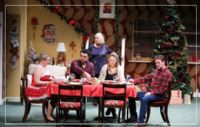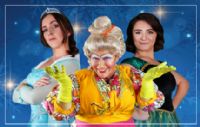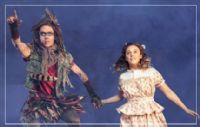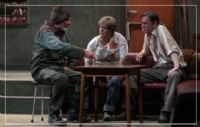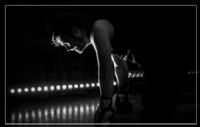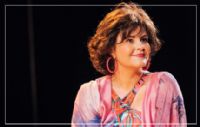Review: Macbeth
Date: 01/03/2017
Theatre Review
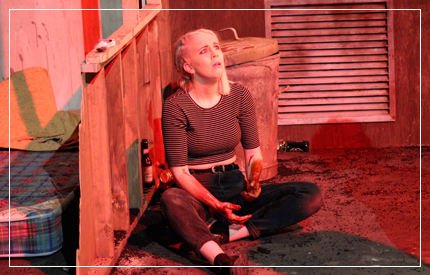
Fionnuala Stevens makes a commanding title character in the Queen's University of Belfast's production of Macbeth. Good thing, too, because her eyes and projection are pivotal to the relentless activity in director Rhiann Jeffrey's all action, all female take on Shakespeare's classic.
This Macbeth, set within the context of a drug gang, with Duncan as a drug lord and the famous "witches three" as heroin addicted prostitutes, is the kind of work that would terrify purists with its aesthetics yet endear with its stark relatability.
In this world, the physical boundary of sex is less important than the emotional boundary of gender, and QUB alumna Jeffrey - who is establishing a reputation in my mind for eking extraordinarily humane passion from her actors - skilfully breaks down the latter barrier, in theatrical atmospherics that threaten oppression but burst wide open with fire and life.
As we enter the Brian Friel Theatre, we are warned, beforehand, to expect lasers, strobe lighting, gunshots and scenes that may cause events. Are we set for the youthful postmodernism of the 1990s Romeo & Juliet? Excessively flashy imagery, too-clever-by-half references and a pop soundtrack? No, actually. Whatever our early impressions, the gimmickry will not overtake the humanity. Macbeth is something much more interesting and universal, and it need not sidestep the eye-popping innovation within.
For example, there's the staggering and off-kilter dance sequence that immediately follows the three witches' first appearance. Like the best of Quentin Tarantino, it's an in-your-face set piece that you don't quite know what to make of. But you want to see more. You want to see a familiar narrative given new twists, an old dog taught new tricks. Macbeth is full of those. It can be loud, brash, exhausting and shocking - but it is also distinctly affecting.
Power, dependency on each other and exploitation are prominent themes as the fourteen young ladies on stage - ten of whom are multiple-role players - take to their parts with energy and vivacity.
The contemporary props, of which there are many, exist more to define the characters in the scenario than to carry them along in the plot. Deirdre Toner plays Duncan with a suitably imposing, God-like snootiness that would shoot anyone who dared to cross her right down. When Macbeth and Banquo (Nuala McCloskey) first spar, they are separated by a black hat and a white coat - black and white that transcends into red through a dual battle of friendship, conscience, and later, betrayal and bloodshed.
Emily Lamey's Lady Macbeth is a superb foil for Macbeth himself (or should that be herself?), her punishing, almost melodramatic frailty matching the wide-eyed, uncertain hysteria that gradually creeps into Stevens' performance, to a near-unbearable level.
Stevens' delivery of the "Dagger Of The Mind" monologue is genuinely frightening, the epitome of Jeffrey's direction. That is to say, the shock visuals without, powerful though they may be, are secondary to the literal blood, sweat and tears within. Jeffrey and her assistant director Patrick Quinn trust the cast to fully find their way into their roles, Shakespeare's wondrous verse abridged in such a manner that the essence of both the characters on the page and on this stage come through in an unprecedented yet worthy fashion.
Also commendable are Una Hickey's costumes (ideal for the neglected, closed-off slackers doused in Bardic prose), Oona Doherty's choreography, and some particularly startling "double, double, toil and trouble" with the three witches and a chemistry set. A cascade of lively, electrified virtuosity, Macbeth is a student drama with adult heart, a tale told by people wise beyond their years, full of sound and fury, signifying everything.
Simon Fallaha
Macbeth ran at the Brian Friel Theatre in Belfast from February 8-11 2017
This Macbeth, set within the context of a drug gang, with Duncan as a drug lord and the famous "witches three" as heroin addicted prostitutes, is the kind of work that would terrify purists with its aesthetics yet endear with its stark relatability.
In this world, the physical boundary of sex is less important than the emotional boundary of gender, and QUB alumna Jeffrey - who is establishing a reputation in my mind for eking extraordinarily humane passion from her actors - skilfully breaks down the latter barrier, in theatrical atmospherics that threaten oppression but burst wide open with fire and life.
As we enter the Brian Friel Theatre, we are warned, beforehand, to expect lasers, strobe lighting, gunshots and scenes that may cause events. Are we set for the youthful postmodernism of the 1990s Romeo & Juliet? Excessively flashy imagery, too-clever-by-half references and a pop soundtrack? No, actually. Whatever our early impressions, the gimmickry will not overtake the humanity. Macbeth is something much more interesting and universal, and it need not sidestep the eye-popping innovation within.
For example, there's the staggering and off-kilter dance sequence that immediately follows the three witches' first appearance. Like the best of Quentin Tarantino, it's an in-your-face set piece that you don't quite know what to make of. But you want to see more. You want to see a familiar narrative given new twists, an old dog taught new tricks. Macbeth is full of those. It can be loud, brash, exhausting and shocking - but it is also distinctly affecting.
Power, dependency on each other and exploitation are prominent themes as the fourteen young ladies on stage - ten of whom are multiple-role players - take to their parts with energy and vivacity.
The contemporary props, of which there are many, exist more to define the characters in the scenario than to carry them along in the plot. Deirdre Toner plays Duncan with a suitably imposing, God-like snootiness that would shoot anyone who dared to cross her right down. When Macbeth and Banquo (Nuala McCloskey) first spar, they are separated by a black hat and a white coat - black and white that transcends into red through a dual battle of friendship, conscience, and later, betrayal and bloodshed.
Emily Lamey's Lady Macbeth is a superb foil for Macbeth himself (or should that be herself?), her punishing, almost melodramatic frailty matching the wide-eyed, uncertain hysteria that gradually creeps into Stevens' performance, to a near-unbearable level.
Stevens' delivery of the "Dagger Of The Mind" monologue is genuinely frightening, the epitome of Jeffrey's direction. That is to say, the shock visuals without, powerful though they may be, are secondary to the literal blood, sweat and tears within. Jeffrey and her assistant director Patrick Quinn trust the cast to fully find their way into their roles, Shakespeare's wondrous verse abridged in such a manner that the essence of both the characters on the page and on this stage come through in an unprecedented yet worthy fashion.
Also commendable are Una Hickey's costumes (ideal for the neglected, closed-off slackers doused in Bardic prose), Oona Doherty's choreography, and some particularly startling "double, double, toil and trouble" with the three witches and a chemistry set. A cascade of lively, electrified virtuosity, Macbeth is a student drama with adult heart, a tale told by people wise beyond their years, full of sound and fury, signifying everything.
Simon Fallaha
Macbeth ran at the Brian Friel Theatre in Belfast from February 8-11 2017



























